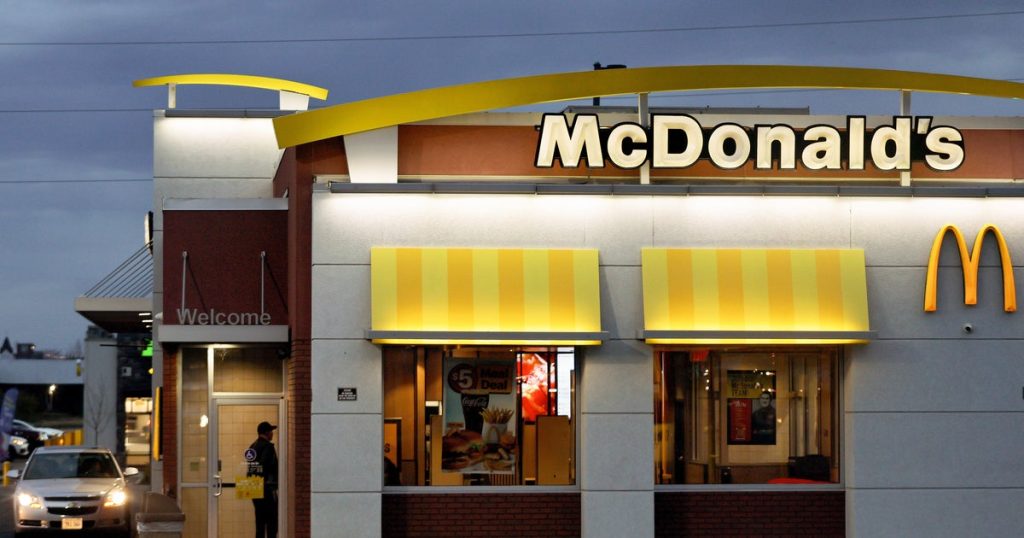In a recent earnings report, McDonald’s, the iconic American fast food chain, reported a significant decline in sales at U.S. restaurants, attributing this downturn to economic uncertainties and a drop in consumer confidence. The company’s same-store sales fell by 3.6% in the first quarter, marking the steepest decline since the onset of the COVID-19 pandemic. CEO Chris Kempczinski highlighted that heightened economic anxiety, particularly among lower-income Americans, is impacting consumer behavior, as the effects of tariffs and tightening economic conditions weigh heavily on decision-making.
| Article Subheadings |
|---|
| 1) McDonald’s Financial Overview |
| 2) Impact of Economic Pressures |
| 3) Consumer Trends and Sentiments |
| 4) Political Climate and Tariff Effects |
| 5) Future Outlook for McDonald’s |
McDonald’s Financial Overview
In its latest earnings report, McDonald’s outlined its financial performance for the first quarter, revealing a worrying trend. The company experienced a 3.6% decline in same-store sales across the United States. This downturn is a stark reminder of the challenges facing not only McDonald’s but the fast-food sector as a whole as it navigates the complexities of a post-pandemic world.
The factors contributing to this decline primarily relate to economic pressures that have disproportionately affected lower- and middle-income consumers. Despite efforts to adapt to market changes, Chris Kempczinski acknowledged that the company could not escape the consequences of a fluctuating economy and changing consumer habits. Without significant adjustments or strategies to counteract these pressures, it may prove difficult for McDonald’s to recover lost sales.
Impact of Economic Pressures
The economic environment has become increasingly turbulent, with factors such as rising inflation and changes in consumer spending forming the backdrop for McDonald’s sales decline. The company noted that many consumers are experiencing heightened anxiety regarding their finances, leading them to prioritize essential spending over discretionary purchases.
Lower-income families have been particularly affected, citing worries about job security and the rising cost of living. In response to these economic conditions, many households are re-evaluating their spending habits. Kempczinski commented that “we’re not immune to the volatility in the industry or the pressures that our consumers are facing,” indicative of McDonald’s recognition of these challenges.
Consumer Trends and Sentiments
As consumer confidence dwindles, trends indicate a shift in shopping behaviors. Customers have begun to delay certain purchases, fearing that ongoing economic instability could lead to inflation affecting everyday goods. Expert analyses have raised fears that the U.S. economy might enter a recession by 2025, exacerbating these consumer concerns.
This sentiment is evident across various demographics, with many Americans choosing to forego dining out as a means of cost-cutting. The overall decline in restaurant traffic, noted in McDonald’s report, reflects a broader trend that may continue if economic conditions do not improve. As McDonald’s navigates this landscape, the company remains cautious, expressing that they are closely monitoring consumer confidence as it fluctuates.
Political Climate and Tariff Effects
Political dynamics, particularly the tariff agenda established by the previous U.S. administration, have further complicated the economic landscape for businesses like McDonald’s. The uncertainty surrounding tariffs has contributed to anxiety that permeates both consumer and business landscapes. Companies are pulling back on growth initiatives and delaying orders due to the unpredictable nature of trade policies.
Despite the administration’s assertions that tariffs will benefit American manufacturing and provide job growth, many companies—including McDonald’s—report feeling the negative impacts. Kempczinski expressed concern that the current state of the economy and the political climate creates a volatile backdrop for consumer behavior, leading to cautious spending. As businesses rethink their strategies in light of these challenges, understanding the interplay between politics and market conditions will be crucial moving forward.
Future Outlook for McDonald’s
Looking ahead, McDonald’s faces a formidable set of challenges as it strives to regain its footing in the fast-food market. The company will need to adapt to the evolving preferences of consumers while also navigating the economic uncertainties that have arisen. Initiatives focusing on affordability and value will likely be paramount in recapturing low- and middle-income customers who have been significantly affected by economic pressures.
Moreover, McDonald’s plans to continue monitoring its market strategies and consumer behavior. By staying vigilant regarding shifts in purchasing habits and responding with timely strategies, the company hopes to mitigate the impacts of economic uncertainties. The path forward will require a careful balancing act, as McDonald’s endeavors to maintain its strong brand presence while responding to a challenging economic environment.
| No. | Key Points |
|---|---|
| 1 | McDonald’s reported a 3.6% decline in same-store sales in the U.S. for Q1. |
| 2 | Economic anxiety among consumers, especially in lower-income brackets, is impacting spending. |
| 3 | Tariffs and political uncertainty are contributing to a cautious business environment. |
| 4 | Changing consumer habits indicate a shift toward conservative spending amidst economic uncertainty. |
| 5 | McDonald’s plans to adapt its strategies to regain customer confidence and boost sales. |
Summary
The recent earnings report from McDonald’s paints a worrying picture of the fast-food giant’s current state amid economic uncertainties. With a significant decline in sales and the impact of external factors such as tariffs, McDonald’s must navigate a complex landscape to remain resilient. The company’s future efforts to engage with consumers and adapt to shifting sentiments will be vital in the coming months as it addresses the challenges posed by a volatile economy.
Frequently Asked Questions
Question: What is the primary reason for the sales decline at McDonald’s?
The primary reason for the sales decline at McDonald’s is economic uncertainty, which has led to decreased consumer confidence and spending, particularly among lower-income individuals.
Question: How have tariffs affected consumer behavior?
Tariffs have increased anxiety among consumers, causing many to delay purchases and re-evaluate their spending habits due to concerns over inflation and rising costs of goods.
Question: What strategies may McDonald’s implement to recover sales?
McDonald’s may focus on affordability and value-oriented offerings to recapture the attention of cost-conscious consumers and boost overall sales amidst economic pressures.


